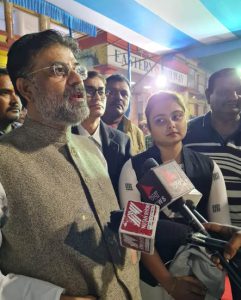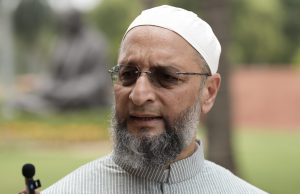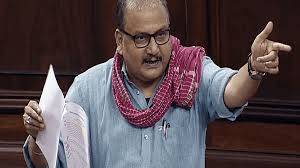Leadership Crisis or Turning Point? Shamim Ahmed’s Insightful Reflection on Bihar Politics and Muslim Representation
By Qalam Times News Network
SEO Meta Description:Veteran leader Shamim Ahmed unpacks the deepening leadership crisis in Bihar’s political landscape in this exclusive conversation, calling on Muslim voters to move beyond charisma and embrace principle-based politics in times of turmoil.
Introduction: When Leadership Crisis Becomes a Test of Collective Wisdom
In the richly layered political and cultural mosaic of Bihar, few voices speak with the kind of clarity, conviction, and emotional depth as Shamim Ahmed, affectionately known as Qaid-e-Urdu. Far from being just another political leader, Ahmed has come to symbolize a blend of cultural conscience, principled politics, and unwavering dedication to pluralistic democracy. For over two decades, he has stood with the marginalized, championed the cause of Urdu, and spoken truth to power when others chose silence.
In this thought-provoking conversation with Dr. Mohammad Farooque, Ahmed reflects on Bihar’s current political scenario, the challenges facing Muslim voters, the myth of instant leadership, and the dangers of emotional politics. His observations go beyond electoral strategy—they are a mirror to our democratic maturity.
“This Is Not the Time to Create Leaders—It’s the Time to Make Wise Decisions”

Dr. Farooque:
Mr. Ahmed, how do you interpret Bihar’s current political atmosphere, especially in light of what the Muslim electorate is facing?
Shamim Ahmed:
This is not just an election season—it’s a cultural and intellectual reckoning. Muslim voters are confused and conflicted. AIMIM is invoking raw emotion, Prashant Kishor is entering with fresh rhetoric, and then there’s RJD, with which Muslims have had a deep historical and ideological connection. I must say this clearly: this is not the time to create leaders—it’s the time to make decisions based on insight and awareness. Emotions won’t protect our future. Only wisdom will.
AIMIM and the Illusion of Political Autonomy
Dr. Farooque:
Many young Muslims see Asaduddin Owaisi as a champion of political autonomy for the community. Do you agree?
Shamim Ahmed:
I don’t doubt Owaisi’s intentions. But intentions alone don’t safeguard rights—results do. When critical bills like the CAA, NRC, and the Waqf Amendment came up in Parliament, how many Muslim MPs stood in resistance? It was non-Muslim leaders like Dr. Manoj Jha who spoke out with courage and clarity. Owaisi, meanwhile, was delivering speeches—fiery, yes, but detached from ground impact.

If we vote based solely on religious identity, we ignore those 60–70 secular-minded Hindu leaders who have consistently raised their voices in our defense. This so-called “autonomy” can easily turn into fragmentation, and the only beneficiary will be our adversaries.
Manoj Jha: A Rare Conscience in Parliament
Dr. Farooque:
How do you view RJD, and specifically Dr. Manoj Jha?
Shamim Ahmed:
Dr. Jha is not merely a Parliamentarian. He is the conscience of our times. His historic speech against the Waqf Amendment Bill wasn’t about appeasing Muslims—it was about defending the Constitution, secularism, and humanity. When SIR (Special Revision) began manipulating voter rolls—targeting Muslims, Dalits, and migrant laborers—it was Jha who took the matter to the Supreme Court.

Such acts are not political performances. They are moral decisions. When most leaders are afraid of being labeled “pro-Muslim,” Jha has had the moral courage to speak the truth. And that is leadership in its truest sense.
AIMIM Must Choose Principle Over Politics
Shamim Ahmed (continued):
If AIMIM is serious about its commitment to justice, it should unconditionally support the INDIA bloc and step away from elections. Why? To prevent vote division. Only through unity can we confront the growing threat of majoritarian extremism. Political ego must not get in the way of community survival.
Oratory with Purpose: The Depth in Manoj Jha’s Voice
Dr. Farooque:
You’ve often praised Dr. Jha’s tone and manner of speech. Could you elaborate?
Shamim Ahmed (smiling):
His speeches aren’t rhetorical performances—they are acts of conviction. There’s a rare harmony in his delivery: gentleness in tone, and rigor in reasoning. He doesn’t just present a viewpoint—he draws a principled line in the sand.
In private meetings too, he talks about real issues—education, minority rights, constitutional guarantees. He brings humanity back into politics. That’s why I call him a citizen first, and a politician second. That distinction matters.
On Choosing the Right Political Alliance
Dr. Farooque:
Should Muslims in Bihar support any specific leadership in this political climate?
Shamim Ahmed:
We must stop choosing parties based on charisma or catchphrases. The true question is: who has stood for constitutional values when it mattered? Who has proven their integrity in the face of adversity?
Politics isn’t just about being present—it’s about standing for something. Our allegiance should go to those who consistently uphold justice, not to those who merely wear a label.
Let us rise above personality worship and focus on character and continuity. That is the only way we can build lasting political strength.
Prashant Kishor and the Ambiguity of New Politics
Dr. Farooque:
How do you interpret the emergence of Prashant Kishor and his Jan Suraaj movement?

Shamim Ahmed:
New political experiments are welcome—they signify democratic evolution. Kishor is a smart strategist and raises pertinent questions. But real leadership demands more than smart questions. It needs ideological clarity.
He criticizes RJD but soft-pedals BJP. That inconsistency is dangerous. He fields Muslim candidates in Muslim areas, but doesn’t boldly confront Hindutva politics. That strategic silence benefits the communal right wing.
If Jan Suraaj wishes to bring real change, it must commit to clear constitutional principles and confront all forms of bigotry—without exception. If it does, perhaps by 2030, it will become a serious force. But as of now, its silence speaks louder than its slogans.
Youth, Social Media, and the Mirage of Instant Wisdom
Dr. Farooque:
Do you think politically engaged youth today understand the depth of what’s at stake?
Shamim Ahmed:
No. Real political understanding doesn’t come from Instagram reels or viral clips. It’s shaped by history, pain, lived struggles. If young voters make decisions based on followers and speeches, they’re setting themselves up for disappointment.
Politics is not performance. It’s a discipline of awareness, patience, and ideological consistency. That truth must be learned—or relearned.
Final Thoughts: A Call to the Muslim Electorate in Bihar
Dr. Farooque:
What is your message to the average Muslim voter in Bihar?
Shamim Ahmed (solemnly):
The greatest wisdom is to understand the call of time. Today’s choice is not about removing or electing someone—it’s about securing our collective future.
Many voices will make promises. Some will roar; some will whisper. But ask yourself: who stood by you in your hardest hour? History always remembers who stayed silent and who stood firm.
We must identify who embodies unity, and who sows confusion. This is not the time to chase temporary excitement—it’s a time for clarity and commitment.
If we fail to discern today, future generations will ask: Why did we choose division when unity could’ve saved us?
This decision is for today—but its consequences will be written into tomorrow’s history.
Reported By: Qalam Times News Network
Interview Conducted By: Dr. Mohammad Farooque







